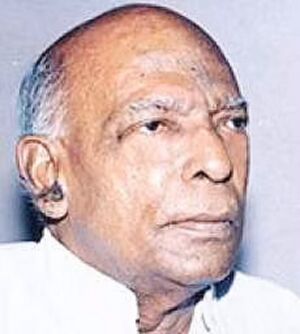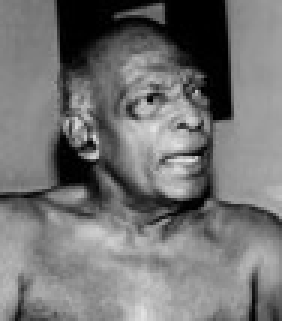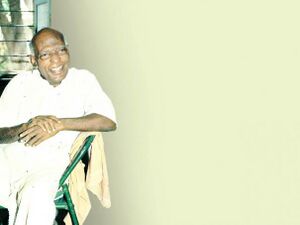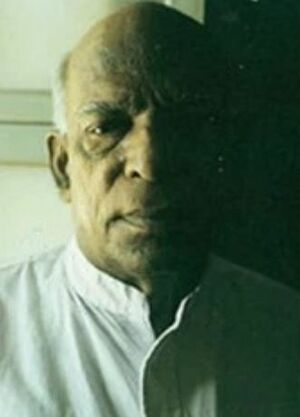Pa. Singaram
இந்தப் பக்கத்தை தமிழில் வாசிக்க: ப.சிங்காரம்
Pa. Singaram (August 12, 1920 - December 30, 1997) is a Tamil novelist. He has written two popular novels in the backdrop of Tamil diaspora. Puyalile Oru Thoni, a forerunner in the non linear narration is one among them. This novel is considered as a work of art in which the satire of high quality is depicted.
Birth, Education
Pa. Singaram was born on August 12, 1920 to K. Palanivel Nadar and Unnamulai Ammal at Singampunari, Sivagangai District a
as their third son. Subramaniyan and Baskaran were his siblings. His family winto gn garment business along with his grand father Kumarasamy Nadar. Pa. Singaram had his primary education at Singampunari Primary School and then completed his high school education at St. Mary's High School, Madurai.
Personal Life
After completing his high school education at Madurai, Pa. Singaram moved to Medan, Indonesia to work with his relative S. K. Chinnamuthu Pillai. He got married in Medan. When Pa. Singaram was 25 years old, his wife and child passed away during labour. After living in Malaya for 8 years (1938 - 1946), Pa. Singaram returned to India after the Second World War in the year 1946 and was living in Madurai thereafter. He was employed as a proof reader in the Madurai edition of Thina Thanthi daily and got retired in the year 1987 due to his detoriating health conditions. Pa. Singaram was living alone in a rented room in the YMCA hostel, Madurai for 50 years. He stayed aloof and had not participated in any literary events. After YMCA management forcefully sent him out in the year 1996, he was living in another hotel room till his death.
Literary Contribution
Two Novels
Pa. Singaram got introduced to magazines like Manikodi and Kalaimagal when he was at school. His letters got published in these magazines. He started reading in English after he moved to Indonesia. Pa. Singaram's vision and style had the influence of American novelist Ernest Hemingway. After his return to India, he wrote two novels. The first novel Kadalukku Appal won a prize in Kalaimagal Novel Competition in the year 1959 and was published by Kalaimagal Karyalayam. The second novel Puyalile Oru Thoni that remained as a manuscript for long was published by Kalaignan Pathipagam in the year 1972. Both the novels were not noticed by literary critics when they were published. Apart from these two novels, Pa. Singaram is said to have written essays and short stories that remained as manuscript itself.
Comeback
Due to the difficulties in publishing the novels and the lack of literary attention, Pa. Singaram did not continue his writings. Later he had resentment and discontent towards literature. Literary critic N. Murugesa Pandian, who lived in Madurai, had an interview with Pa. Singaram and published it later. Only a few writers like Ki. Rajanarayanan and Thanjai Prakash liked Pa. Singaram's writings. Ki. Rajanarayanan had written a letter to Pa. Singaram. N. Murugesa Pandian mentions that Thanjai Prakash had met Pa. Singaram in person.
In the year 1987, critic C. Mohan wrote an article about Tamil novels in the pro Tamil Eelam journal 'Pudhuyugam Pirakkiradhu'. He had rated Puyalile Oru Thoni as one of the three best novels of Tamil. This sparked a discussion and drew the attention towards the novel Puyalile Oru Thoni.
Tamizhini publisher and the editor of Pudhuyugam Pirakkiradhu, Mr. Vasanthakumar had a high reputation on Pa. Singaram. Tamizhini publishers brought out a beautiful edition of both the novels of Pa. Singaram as a single book in the year 1998, but Pa. Singaram passed away in the year 1997 while the publishing was underway. The book by Tamizhini was published with a critical essay Varalatru Abathathin Dharisanam by writer Jeyamohan. It was the first critical essay on Pa. Singaram and refuted the earlier criticisms on his novels. Writer Jeyamohan had argued that the denial of the novel by modern literature critics Ka. Naa. Subramanyam and Sundara Ramaswamy
was duon
inearlnarration
narity of , but the non linear and poly phony narrative gives the aesthetic appeal to the novel by which it surpasses the modern literature.
novel re
🔏Being Created-en
Please do not write any content below this line. This section is only for editing templates & categories.




